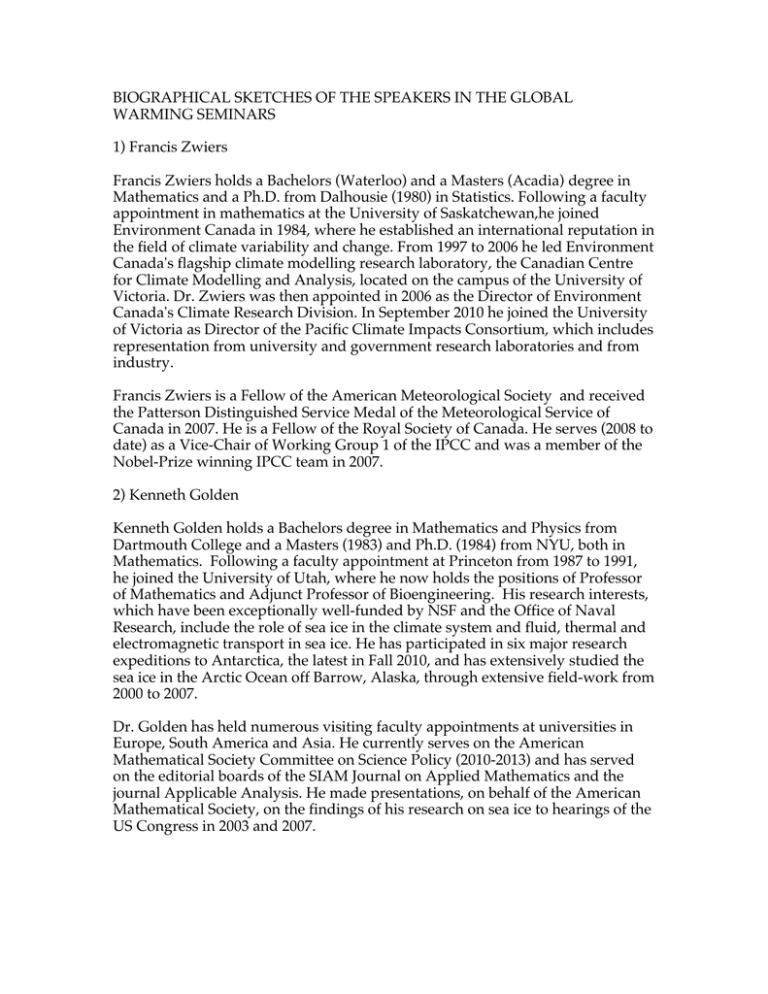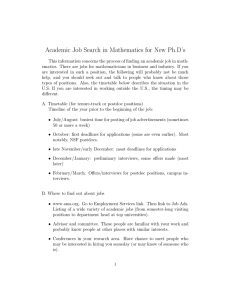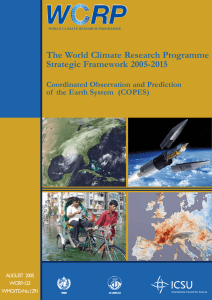BIOGRAPHICAL SKETCHES OF THE SPEAKERS IN THE GLOBAL WARMING SEMINARS
advertisement

BIOGRAPHICAL SKETCHES OF THE SPEAKERS IN THE GLOBAL WARMING SEMINARS 1) Francis Zwiers Francis Zwiers holds a Bachelors (Waterloo) and a Masters (Acadia) degree in Mathematics and a Ph.D. from Dalhousie (1980) in Statistics. Following a faculty appointment in mathematics at the University of Saskatchewan,he joined Environment Canada in 1984, where he established an international reputation in the field of climate variability and change. From 1997 to 2006 he led Environment Canada's flagship climate modelling research laboratory, the Canadian Centre for Climate Modelling and Analysis, located on the campus of the University of Victoria. Dr. Zwiers was then appointed in 2006 as the Director of Environment Canada's Climate Research Division. In September 2010 he joined the University of Victoria as Director of the Pacific Climate Impacts Consortium, which includes representation from university and government research laboratories and from industry. Francis Zwiers is a Fellow of the American Meteorological Society and received the Patterson Distinguished Service Medal of the Meteorological Service of Canada in 2007. He is a Fellow of the Royal Society of Canada. He serves (2008 to date) as a Vice-Chair of Working Group 1 of the IPCC and was a member of the Nobel-Prize winning IPCC team in 2007. 2) Kenneth Golden Kenneth Golden holds a Bachelors degree in Mathematics and Physics from Dartmouth College and a Masters (1983) and Ph.D. (1984) from NYU, both in Mathematics. Following a faculty appointment at Princeton from 1987 to 1991, he joined the University of Utah, where he now holds the positions of Professor of Mathematics and Adjunct Professor of Bioengineering. His research interests, which have been exceptionally well-funded by NSF and the Office of Naval Research, include the role of sea ice in the climate system and fluid, thermal and electromagnetic transport in sea ice. He has participated in six major research expeditions to Antarctica, the latest in Fall 2010, and has extensively studied the sea ice in the Arctic Ocean off Barrow, Alaska, through extensive field-work from 2000 to 2007. Dr. Golden has held numerous visiting faculty appointments at universities in Europe, South America and Asia. He currently serves on the American Mathematical Society Committee on Science Policy (2010-2013) and has served on the editorial boards of the SIAM Journal on Applied Mathematics and the journal Applicable Analysis. He made presentations, on behalf of the American Mathematical Society, on the findings of his research on sea ice to hearings of the US Congress in 2003 and 2007. 3) Kevin Trenberth Kevin Trenberth earned his B.Sc. degree with First Class Honours at the University of Canterbury in Christchurch in his native New Zealand in 1966, followed by his Sc.D. in Meteorology at MIT in 1972. Following a faculty position at the University of Illinois, he took up a position at the National Center for Atmospheric Research in 1984 and has been head of the Climate Analysis Section since 1987. He was a lead author or coordinating lead author of the 1995, 2001 and 2007 Scientific Assessment of Climate Change reports for the IPCC and was a member of the Nobel-prize winning IPCC team in 2007. From 1999 to 2006 he served on the Joint Scientific Committee of the World Climate Research Program (WCRP) and is currently chair of the WCRP Observation and Assimilation Panel and the scientific steering group of the WCRP Global Energy and Water Cycle Experiment. He is a Fellow of the American Meteorological Society (AMS), the AAAS and the American Geophysical Union, and an Honorary Fellow of the Royal Society of New Zealand. He received the Jule G. Charney Award of the AMS in 2000 and the NCAR Distinguished Achievement Award in 2003. He has been prominent in all aspects of climate variability and climate change research, as evidenced by some 450 research publications, and is a recognised leader in the IPCC Assessments and in the WCRP. 4) David Randall David Randall received his B.S. and M.S. degrees in Aeronautical Engineering from Ohio State University and his Ph.D. in Atmospheric Science from the University of California, Los Angeles in 1976. Following positions at MIT and with NASA, he joined the Colorado State University Department of Atmospheric Science in 1988. His current research interests focus on modeling studies of clouds and their role in the global climate system using numerical simulation. Ongoing projects include development of improved cloud parameterization methods, numerical experiments to determine the role of clouds in maintaining the preset climate, and an investigation into the role of clouds in climate dynamics. His research is supported by NASA, by the NSF and by the U.S. Department of Energy. Dr. Randall is a Fellow of the American Meteorological Society (AMS), the AAAS, and the American Geophysical Union. He is a recipient of the NASA Medal for Exceptional Scientific Achievement and the AMS Meisinger Award and is Chief Editor of the Journal of Climate. 5) Jasper Kirkby Jasper Kirkby is an experimental particle physicist at CERN, Switzerland. After completing his degrees at Oxford and London, he spent 12 years at Stanford before joining CERN in 1984. He has built detectors and carried out experiments at accelerators in the United States (BNL AGS, SLAC Linac, SPEAR, and PEP) and Europe (CERN PS, LEP, PSI and RAL). He originated the idea for a new accelerator known as the Tau-Charm Factory, which eventually led to BEPCII in Beijing. He has originated and led several large experiments at accelerators: the DELCO detector at SPEAR; the DELCO detector at PEP; the FAST experiment at PSI; and the CLOUD experiment at CERN. 6) Thomas Pedersen Following his B.Sc. in Geology at UBC, Tom Pedersen earned his Ph.D. at the University of Edinburgh in 1974 in Marine Geochemistry. Following a faculty appointment at UBC, he joined the University of Victoria in 2002 as Director of the School of Earth and Ocean Sciences. In 2003 he was made Dean of the Faculty of Science and in 2009 the inaugural Director of the Pacific Institute for Climate Solutions (PICS). He is an internationally recognized authority on ocean chemistry and has published extensively in the field of paleoceanography (the history of the oceans). His current research is focused on the oceanographic history along the western margin of North America and the relationship of observed variability to global and regional climate change. He has longstanding interests in climate change issues and the application of government policy to climate-change mitigation and adaptation. Dr. Pedersen is a Fellow of the American Geophysical Union (2006) and a Fellow of the Royal Society of Canada (2002). He has been the recipient of a Killam Faculty Research Fellowship and the Michael J.Keen Medal of the Geological Association of Canada.





